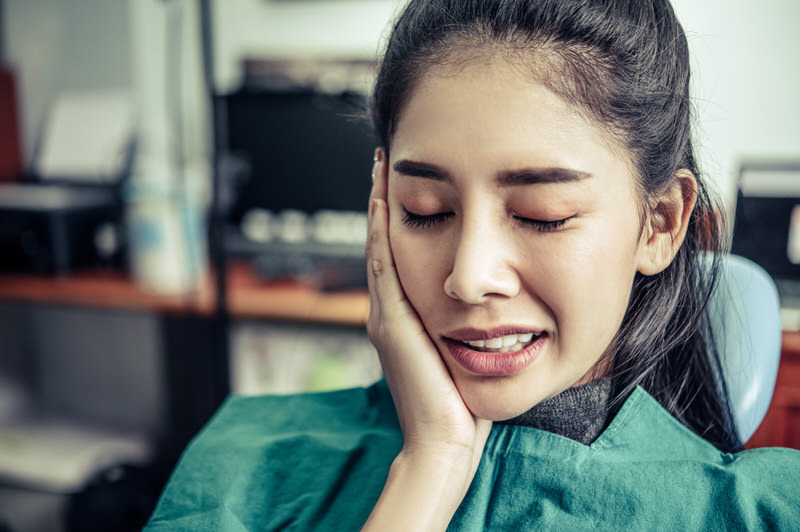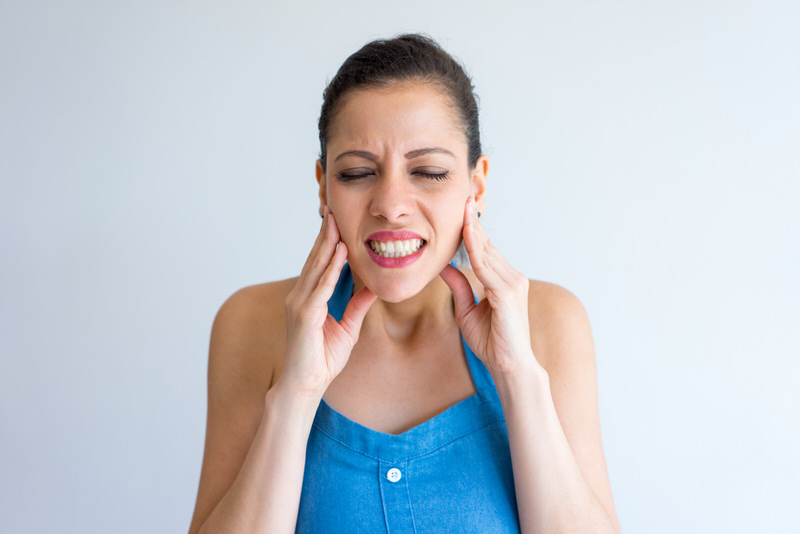The most common and obvious answer to your jaw pain is teeth clenching or grinding overnight. However, there are some other possibilities like muscle disorders and tooth cavities that can cause jaw pain. In addition, if you do grind your teeth a lot, chances are that it might develop into a condition called Bruxism.
Tooth sensitivity, headaches, the difficult sensation of having a tight jaw are all symptoms involving this condition. Visiting a dentist or orthodontist would be recommended, but there are home remedies like applying a warm compress and commendable jaw exercises like the goldfish exercise, which can help you out as well.
The jawbone is the largest and strongest bone found in the human facial skeleton. Your lower jaw plays an important role. It’s responsible for holding your lower teeth in place.
So, if you wake up with jaw pain, it most probably means that there is something off about the way that your teeth may are positioned, especially when you’re sleeping.
But is that the only reason why your jaw can hurt when you wake up after a nap? What is bruxism, and what can cause it? What are the signs and symptoms of bruxism, and how do you minimize the pain associated with it? Can there be other answers for your jaw pain as well? And what are a few good jaw exercises which will help you in the recovery process?
Why does your jaw hurt when you wake up?
If you’ve experienced waking up in the morning feeling a painful pang in your jaw area, the most obvious reason is that you’re clenching your teeth while you sleep. Although it is quite harmless at first, if this teeth-clenching continues daily, it could grow into a sleep-related movement disorder known as bruxism.
This is far more serious because you could be chipping away your teeth, and this can lead to other problems like receding gums and jaw pain that never seems to go away.
If you’re confused as to why this happens, it’s because our teeth are only supposed to touch when we chew. So when we are relaxed, our teeth naturally separate from each other without clenching.
So, by grinding your teeth at night, you are unknowingly engaged in a “parafunctional activity” because your teeth are doing something they aren’t supposed to do. This stresses your face muscles and jaw joints, explaining the pain and soreness you feel when you wake up.
What is Bruxism?
Bruxism happens when you grind your teeth regularly. It can happen for various reasons, including your genes, emotional status, medication, and age.

These reasons also contribute to Bruxism.
- Imperfect tooth alignment – when your teeth aren’t positioned correctly, your teeth may touch. This can cause your jaw muscles to stretch and your brain notifies this discrepancy to your teeth. So, your teeth try to grind into a better position. If this is what’s happening, you might need to get a filing at the tops of your teeth or get braces.
- Stress and anger – You must’ve already noticed that when you’re anxious, stressed, or angry, the frustration automatically makes your teeth clench and grind. While this is quite normal, if you’re in constant stress, it might affect you negatively and give you jaw pains. A 2019 study revealed a significant correlation between Bruxism episodes when compared to the perceived stress scale.
- Substances & Medications – Bruxism can be caused as a rather uncommon side effect of medications. The culprit can be certain antidepressants, recreational drugs, tobacco, and even beverages containing caffeine. In a 2016 study, the chances of sleep bruxism have increased to almost 2 times for alcohol drinkers and almost 1.5 times for ones that drank more than 8 cups of coffee per day.
- Various disorders – Bruxism can happen if you’re already having other disorders that are interconnected with mental health such as Parkinson’s disease, dementia, epilepsy, sleep apnea, and ADHD (Attention-deficit/hyperactivity disorder)
Apart from the above list, Bruxism can also be common among young children. But you don’t need to worry too much about it as it usually fades away with adulthood.
If your family members have bruxism, there is a good chance that you might also have it.
What are the signs and symptoms of Bruxism?
Apart from the lingering jaw pain, you might also experience several other symptoms of Bruxism, as listed below in the table. We have also provided some remedies that can help ease the pain.
| Symptom | What can you do about it? |
| Teeth grinding out loud enough to wake up your significant other. | You can try using a mouth guard, which acts as a ‘crash helmet’ for teeth. |
| Increased tooth sensitivity | Rinse your mouth with warm salt water. |
| Earaches | Apply moist heat to the area and eat soft foods. |
| Sleep disruption | Avoid stimulating substances in the evening |
| A tight jaw that won’t easily open and close. | Try opening and closing your mouth very slowly to warm up. |
| A light headache in your temples. | Try massaging your head and warm compress. |
Can there be other causes of jaw pain?

Now that we have discussed the most likely reason for your jaw pain let’s review some less common possibilities as well.
Temporomandibular joint and muscle disorders, also known as TMJ disorder, are caused by a condition in which your temporomandibular joint (the joint that attaches the jaw to the side of your head) does not function in a normal way.
So, when your joint starts to malfunction, you might feel intense jaw pain as a symptom, especially if you’re constantly moving your jaw while in sleep.
Another possible reason is tooth cavities.
If your cavity goes untreated, you will notice intense pain along your jaw and possibly even a headache. But this isn’t just limited to when you wake. It can linger at any point of the day. If this is what you’re experiencing, you can try home remedies like a cold compress to ease the pain but of course, the best thing to do would be to visit your dentist and get your tooth filled.
What are some jaw exercises for recovery?
If you find mouth guards very annoying and uncomfortable, these may be the best options for you, especially because it doesn’t involve any complex activities. I
In fact, according to a 2010 study on people with TMJ disc displacement, TMJ exercises help your mouth opening range even more than mouth guards do.
- Goldfish exercise for partial opening – For this, you need to position your tongue to the roof of your mouth and place one finger to the front of your ear. (Which is the place where your TMJ is) Place another pointer finger on your chin and proceed to drop your lower jaw partially and then close it again. Repeat this exercise six times in one set and follow 6 sets per day. This shouldn’t be painful and you should only feel a mild resistance.
- Chin tucks – Move your shoulders back and bring your chest up. Now just pull your chin backward as if creating a double chin and pause in that position for 3 seconds. Repeat this process 10 times.
- Tongue-up exercise – You can easily do this by touching the roof of your mouth with your tongue and gently opening and closing your mouth.
- Side-to-side jaw exercise – For this, you will need a ¼ inch object to place between your front teeth. You can use a stacked tongue depressor for this purpose. Then, you should slowly shift your jaw from side to side. Once your jaw becomes used to this, it gets easier. Then you need to increase the thickness of the object by piling another on top of the one you’re using.
Conclusion
While the above methods are useful in handling jaw pain and minimizing it, when it comes to severe pain, you may have to resort to more invasive treatments like corticosteroid injections and eventually surgery as a final resort.
Exercises, maintaining a soft-food diet, treating your other symptoms, following home remedies to ease your pain will assist you in the long run. So, it’s best to treat your jaw pain at the first glimpse of discomfort itself rather than waiting it out. Remember, a stitch in time saves nine.


